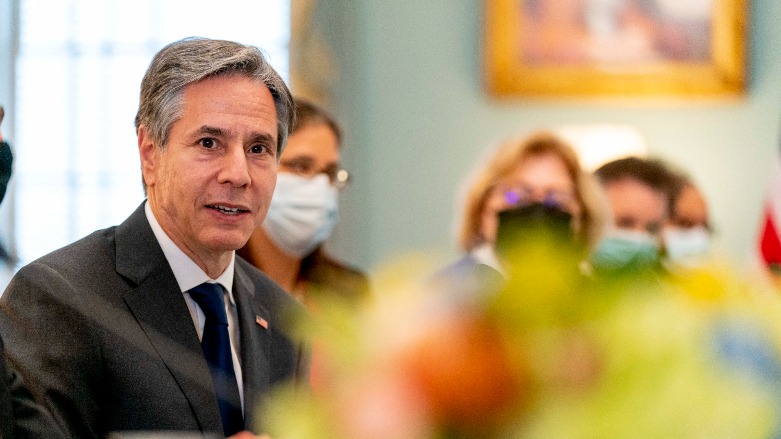US hosts Israeli, UAE Foreign Ministers on first anniversary of Abraham Accords

WASHINGTON DC (Kurdistan 24) – The Foreign Ministers of Israel and the United Arab Emirates (UAE) met in Washington on Wednesday together with US Secretary of State Antony Blinken in a trilateral meeting and then also separately with him in bilateral meetings.
The event was held on the first anniversary of the Abraham Accords, a series of normalization agreements concluded under the Trump administration between Israel, on the one hand, and the UAE, Bahrain, Morocco, and Sudan, on the other.
The Abraham Accords represent the most successful US effort at Middle East peace-making since the 1994 peace agreement between Israel and Jordan—although the “peace process” was the focus of Bill Clinton’s diplomatic efforts in the Middle East for the entire eight years of his presidency.
The Accords are named after the patriarch, Abraham, the common ancestor of Jews, Christians, and Muslims. According to tradition, Abraham was born in the land of Ur in modern-day Iraq—although Iraq is not one of those countries that have reached such an accord with Israel and actually opposes the notion.
Blinken Hails Agreement between Israel and UAE
“The UAE-Israel relationship,” Blinken stated in a press conference before the senior diplomats’ trilateral meeting, has “flourished this past year.”
Blinken noted that Israel had opened an embassy in the UAE, “the first it has ever had to a Gulf nation,” while Israel’s new ambassador to the UAE had presented his credentials a few days ago.
In addition, Blinken continued, “The people-to-people ties” between Israel and the UAE “are also thriving, even with COVID.”
There are now direct flights between Israel and the UAE, and some 200,000 Israelis have visited the Arab country over the past year, he explained.
Notably, those flights cross over the airspace of Saudi Arabia, an indication of Saudi tolerance, if not approval, of the normalization accords.
Working Groups: Religious Tolerance and “Climate-smart Agriculture”
Two new working groups were established among the US, UAE, and Israel, Blinken explained. One is on “religious coexistence.”
“This is a moment of rising anti-Semitism,” he said, and “rising Islamophobia,” as well. Indeed, the right-wing populism that has established roots in the US, as well as Europe, includes elements that promote animosity toward both Jews and Muslims alike.
“We want Israel, the United Arab Emirates, and the United States to work together to build tolerance and ensure that all religious groups can worship in their traditional ways without violence, without intimidation, without discrimination,” Blinken stated.
The second working group involves water, which can be a scarce resource throughout the Middle East, and energy.
“Israel has joined the Agricultural Innovation Mission for Climate, a joint US and UAE initiative to catalyze new investment in climate-smart agriculture,” Blinken explained. “Israeli and Emirati firms are already planning to collaborate on a number of renewable projects.”
Israel’s Foreign Minister Yair Lapid noted that two weeks ago, he had paid his first visit to Bahrain, where he had met the King of Bahrain, Hamad bin Isa Al-Khalifa.
Bahrain and Israel have also established direct flights that overfly Saudi Arabia, while ambassadors have been appointed from both countries.
The UAE Foreign Minister noted the youth of his country—a mere fifty years, since it became independent in December 1971.
“We are very proud that in less than 50 years of our federation, we’ve managed to come to where we are today,” he said.
Bin Zayed praised the US for its “strong commitment” in “building bridges between two successful nations” that are committed to “further development” and “changing the narrative in the region, especially among our youth.”
Areas of Disagreement
The biggest area of disagreement among the three senior diplomats involves Iran. Both Israel and the UAE are quite concerned about Iranian activities.
Lapid, who had met with US National Security Adviser, Jake Sullivan, on Tuesday, reiterated Israel’s apprehension about Iran’s nuclear activity, a worry shared by the UAE, as well as Saudi Arabia and Bahrain.
“At the center of my visit here is the concern about Iran’s race to nuclear capability,” Lapid said. “Iran is becoming a nuclear threshold country. Every day that passes, every delay in negotiations, brings Iran closer to a nuclear bomb.”
Blinken responded that the US would not wait indefinitely for Iran to resume negotiations. “Time is running short,” he said—but gave no deadline for the talks to resume.
Bin Zayed was asked about Yemen, where Iran supports the Houthis. “We are all working very hard among friends to ensure that the Yemenis can have a better life,” he said.
But we also don’t want to “end up with a situation where we have another Hizbollah,” he stated, referring to the group in Lebanon, “threatening the borders of Saudi Arabia.”
“The Houthis have managed to develop their capabilities in the last few years in a way which is much faster than the trajectory of Hizbollah” he warned.
In addition, China is an area of disagreement between the US and Israel. Israel has long had extensive defense ties with China, while the US increasingly sees it as a major challenge.
“We’ll be candid with our Israeli friends over risks to our shared national security interests that come with close cooperation with China,” a senior State Department official told journalists on Tuesday.
In addition, the Biden administration is committed to a two-state solution to the Israeli-Palestinian conflict, while it plans to reestablish the US consulate in Jerusalem, which was devoted to Palestinian affairs until Trump closed it. However, Israel opposes both ideas.
